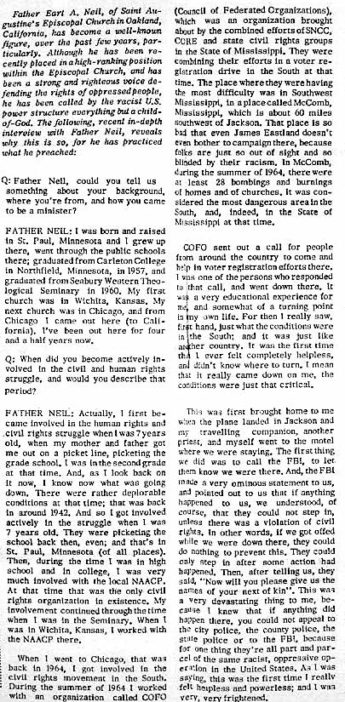In this interview from The Black Panther with Father Earl Neil of Oakland’s St. Augustine’s Episcopal Church, Neil speaks on his personal experiences with racism, civil rights, structural racism, and partnering with the Black Panthers.
Earl Neil’s journey as an activist began at a very young age, seven to be exact as he marched alongside his parents for human and civil rights. That spirit has carried along with him all throughout high school, college, and seminary school where he was always involved with the local NAACP. It was in Chicago where now Father Earl Neil would become more involved with the fight for civil rights. In the Summer of 1964, Father Neil was working for the Council of Federated Organization (COFO) an organization that was fighting for civil rights throughout the United States and in particular areas in the deep south, areas that have historically been very racially divided. COFO had put out an open call for people around the country to help with voter registration and education in the city of McComb, Mississippi. Father Neil would be one of the few who answered the call and it proved to be an eye-opening and life-changing experience.
McComb, Mississippi was a city with a very apparent and very violent racial divide, during the summer of 1964 there were 28 bombings and burnings of homes and churches making the city one of the most dangerous cities in the South. Upon landing in McComb, Father Neil had called the FBI to inform them about their arrival to which the FBI stated they could not do much to help them unless it whatever happened was a violation of civil rights. Feeling helpless from the local and national authorities it was even more reason to fight for change.
Even though signs pointed to avoid cities like McComb, Father Neil understood the importance of creating change in cities that are afraid of it. Father Neil would later partner with Dr. Martin Luther King Jr at the Southern Christian Leadership Conference and all the events that would lead to the Selma to Montgomery March. Father Neil was in charge of the orientation of all the people that would come to Montgomery to march. The orientations consisted of understanding how to survive in the South. Later Father Neil would join Dr. King in Chicago advocating for better living conditions for Blacks in Chicago. During his time in Chicago, he would first hear of the Black Panthers and eventually make his way to Oakland where he would partner with the Black Panthers. The Ten Point Program the Black Panthers had established was something Father Neil would relate too and brought Father Neil to help the Panthers.
Near the end of the interview, Father Neil calls attention to the systemic racial bias embedded in the American legal system, drawing upon his experience as one of the few jurors of color during his time as part of an Alameda County Grand Jury. The flawed process of selecting who is involved as members of the grand jury sheds light on the inequities that take part in the judicial system. Father Neil points out how the process of nomination is just acquaintances of judges. Members of the community that do not fit into the “desired” qualifications are left out which in turn are usually members of the community who are underrepresented.
